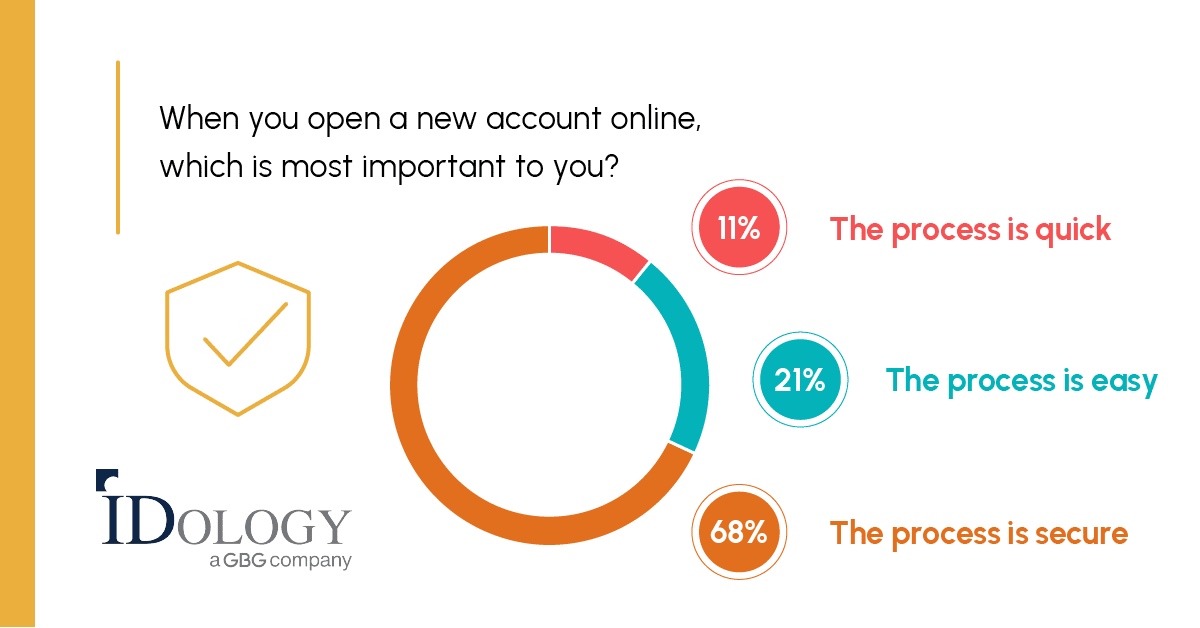How to meet consumer demand for secure and convenient digital experiences
Data from a recent IDology study shows consumers want both and, with the right technology in place, businesses can provide it all.
With a flood of digital adoption in recent years, businesses face unrelenting pressure to deliver onboarding experiences that build trust. IDology’s Fifth Annual Consumer Digital Identity Study examines how consumers view the threat of fraud, their expectations regarding privacy and what can be done to foster trust, especially during online onboarding experiences. Findings suggest that while security is top of mind for most Americans, they still demand convenience in their online interactions with businesses.
The pressure is on to deliver experiences that build trust during make-or-break moments in the customer relationship. Businesses must do more to provide experiences that balance convenience and security, and with intelligent identity verification workflows technology in place, they can confidently strike a balance between these seemingly competing consumer priorities while driving revenue and staying compliant.
Consumers demand a balance of security and convenience
68% of consumers rank security as being most important to them when they create an online account. So it’s clear businesses can expect most consumers making the decision of whether to sign up for a new account to be heavily influenced by how safe they feel. Losing a customer’s trust when the security of a digital interaction fails to meet their expectations could mean losing business and have significant, long-lasting implications, especially if a competitor can deliver a better experience.

However, there’s also good reason for businesses to invest in convenient digital interactions. Research shows that 45% of consumers reported strongly disliking it when companies require additional security checks. Additionally, 37% of consumers abandoned signing up for a new online account if they found the process too difficult or time-consuming.
Consequently, businesses face abandonment if a workflow is seemingly untrustworthy, but if they have too many security hurdles, that could lead to the same result. Businesses ultimately must ensure trust with consumers through safe digital experiences without adding unnecessary friction. The good news is that providing a secure experience no longer has to come at the expense of a convenient one. By successfully implementing intelligent identity verification solutions, businesses create opportunities to exceed consumer expectations for safe and efficient digital experiences.
How to strike that balance
76% of consumers reported showing a preference for a company if that company was using particularly more advanced identity verification. Additionally, consumer confidence in specific identity verification tools rose. Verification tools like dual-factor authentication and Knowledge-Based Authentication (KBA) both saw increases in consumer confidence. Consumers are also becoming more familiar with these tools, with 53% reporting having provided further proof of their identity in the past 12 months.
Businesses can establish more trust with new and returning consumers through secure, low-friction workflows by reviewing details that users may be more comfortable providing. For example, with a flexible identity verification solution in place, businesses can perform a ‘soft’ check using less sensitive data points that the consumer would be more willing to provide with minimally invasive verification.
Providing a competitive edge
Businesses face a difficult challenge in delivering this seemingly elusive balance of security and convenience. But it is not unattainable, and with increasing competition and a more crowded marketplace than ever, it is imperative businesses meet this challenge head-on. With intelligent identity verification technology, businesses can confidently locate, verify and approve more legitimate customers faster and gain a competitive edge.
See the infographic below and download IDology’s Fifth Annual Consumer Digital Identity Study to learn how to meet customer expectations without compromising on security or convenience.

